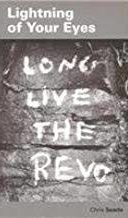Lightning of Your Eyes: new and selected poems
By CHRIS SEARLE (Middlesborough, Smoke Stack Books, 2006) 123 pp., paper, £6.99.
These poems are not for reviewing, but for response. They grab you by the throat, by the heart – if you will let them, get into them, let them get into you. Forget rhyme and metre and craftsmanship. Listen, instead, to the world of Chris Searle reminding us it is your world and mine and our children’s, not theirs, the money-changers, the power mongers – and it’s time we wrested it from them as others have done before us: there’s no end to struggle, renewal, hope.
Poems that touch awake the flame of anger against injustice, all sorts of injustice. Poems that celebrate life and love and growth.
These are love poems – the poems of a man who loves people, children, all growing things, the world. And wants to make it better, sings hosannas to them that make it better. A gentle revolutionary who reminds us that revolution begins in love and must end in love, a larger love.
Poems that do not despise ignorance, but educate it. A teacher yes, but an exemplar too.
Poems that embody true British values: universal values.
‘As my mother knits blankets for Ethiopia’ is startling in its profundity: a working-class woman with the usual prejudices about darkest Africa, knitting blankets of love for Ethiopia.
you who never strayed from England
. . .
whose father was a conservative
so his daughters were conservatives whose husband feared Africa
so his wife feared Africa – have so much love inside you
love I know
. . .
love now given to Africa in surprise
to the unknown Ethiopian.
Amor Vincit omnia.
A poet, a writer who knows the burden of words that he might have said with Vale` ry that ‘language is the God gone astray in the flesh’.
I want to see our words
put food in the mouths of children
. . .
I want to see our words dismantling missiles disintegrating bombs
. . .
I want to see our words growing bluebells
over the graves of hatred
. . .
I hate profiteering words for they rip up lives
I hate useless words
for they hide what is true and they decorate deceit
I hate lying words
because they kill people. (From ‘Passage’)
A poet for whom history is now and was always now.
I found myself huge like mankind, as vast as its history,
And no box could take my limits, no death my new beginning. Truth to tell, I looked down upon my funeral
And my funeral was the march of the world
Shades of Walt Whitman here – and the march proceeds:
Past Aldgate where John Ball had stood in all the power of the peasant
And Tyler shouted down the walls that kept them poor,
Through the grimy valleys of Whitechapel where Flemish weavers Had struggled manfully for Wilkes and liberty
And Mendoza the Jew had boxed to Science and greatness – Through these streets they bore me, bore me homeward.
(From ‘A Dream of Alfred Linnell’)
Then, suddenly, in the midst of all this love and wisdom is his love for Wisden. Not since CLR James’s Beyond a Boundary have I evinced so keen a pleasure at having once, in my Ceylon youth, been a bowler of the wily Tamil googly, the predecessor to Murali’s ‘doosra’. And Searle’s gleeful sighting of Wes Hall reminded me of the time when the West Indies came to Ceylon with their three Ws (Weekes, Worrell and Walcott) and awed us in wonderment at the sunlit poetry of their cricket. And were themselves awed by the prowess of our own joyous, heady, vagrant Satha (Sathasivam) who batted with the grace of a gazelle, the touch of gossamer and the abandon of imperishable youth. If socialism created the fourth international, cricket created the fifth– for cricket is indeed the basis of the Commonwealth, and when the political Commonwealth is gone, there will always be a Commonwealth of cricket – garnered from the green fields of village England, the streets of Trinidad, the beaches of Sri Lanka, the slums of Mumbai.
Such memories Chris Searle evokes, such tasks he sets before us, such hope he snatches from the air we breathe.
Thank you, Chris.

